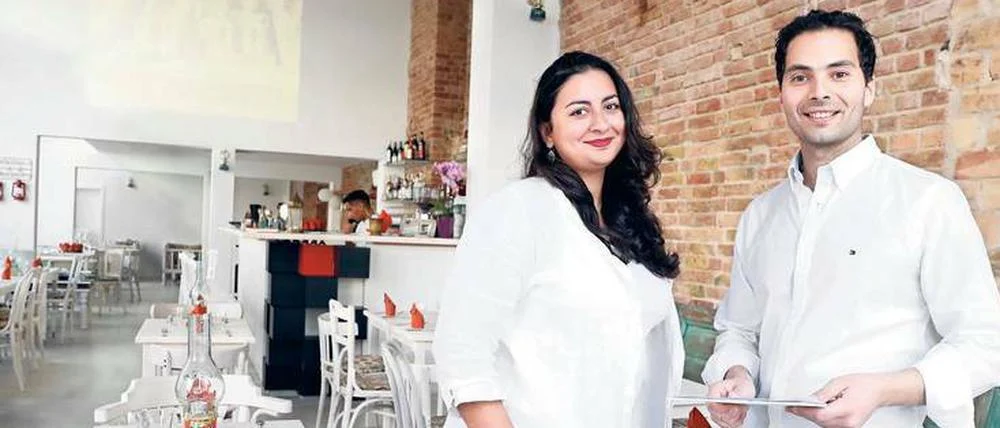High ceilings, large windows and over 400 square meters of space. If one were to describe the atmosphere in the “Lawrence” at Oranienburger Strasse 69 on the corner of Tucholskystrasse with one adjective, it would probably be “open”. The “Lawrence” is a place of cultural and creative exchange with a café, restaurant, co-working space, shop, gallery and studio. On the “Common Cause” day of action on September 9, Berlin children will write letters to children in Lebanese refugee homes together with Lina al Haddad, a psychologist from Syria, in order to create real closeness despite the physical distance.
Berliners and the newcomers
“We are cultures,” says Frank Alva Buecheler, who shares the management of the “Lawrence” with Bashar Hassoun. “It’s actually a cultural center, but that always sounds like unwashed socks,” says Buecheler. “It’s meant to be a meeting place. For newcomers, for Berliners, for tourists, to experience and discover new things, and the way to a person’s heart is through their stomach.”
Buecheler and Hassoun refer to refugees who now live in Germany and are building a new future here as newcomers . “The meal brings everyone together at one table. Regardless of religion or nationality,” adds Hassoun, who is a trained businessman and fled Damascus a few years ago .
A glance at the ceiling reveals that the newly opened “Lawrence” is a place of cultural exchange: In addition to old Berlin stucco, there is also a new Arabic plaster band to be discovered. And once you sit down inside, you can catch a generous view of the New Synagogue.
Ways out of Postcolonialism
The project is the latest project of the “Freeartus” society. Buecheler, who is also a director and author, had organized concerts with the refugees in a refugee center and also visited refugee camps in Lebanon. This gave rise to the idea of founding “Freeartus” to focus on supporting refugees in the creative sector. They organize concerts and exhibitions for the artists or make important contacts.
The focus is on the exchange of cultures through the language of art. It is important to the organization that the refugees are included . “We wanted to put an end to this post-colonial attitude of ‘we know what is good for you’,” says Buecheler, “so we decided to organize the support of newcomers differently.”
“Freeartus” is now a partner company of the Union of Relief and Development Associations – an umbrella organization of over a hundred nonprofit organizations.
Pushed to the Margins
The fact that the refugees are always fully integrated into the work and development of the organization is also evident in the “Lawrence”: The majority of the employees come from Syria, and the idea for the cultural center also came from them. After the temporary refugee home on Große Hamburger Straße was closed, an important place in central Berlin was lost for many.
“Many newcomers said they did not want to be pushed to the outskirts of the city,” says Buecheler. In order to remain visible in the center and in political Berlin, they looked for a property in Berlin Mitte. Since March, the shop of the former Monbijou pharmacy has been renovated – by German and Syrian construction workers.
Hassoun and Buecheler want to serve their guests traditional oriental food, such as the rice dish Maqluba. “We want to introduce other flavor variations beyond falafel,” says Hassoun. Sitting on cushions with embroidered fabrics from Damascus and between original Syrian lanterns, curious and tolerant guests can get an impression of Arab culture .
And vice versa: The aim is to bring the European way of life closer to the refugees. “It’s about meeting and exchanging ideas. We need to learn more from each other,” says Hassoun.
Something to touch
The theme of exchange will also be the focus of the “Lawrence” on the “Common Cause” day of action: Together with al Haddad, Berlin children will then write letters for children in Lebanese refugee camps. The form of this communication is deliberately chosen: “For the children there, it is something special to receive a letter and thus to hold something in their hands,” says al Haddad, who is a psychologist and doctoral student in comparative cultural developmental psychology at the Free University. She remembers her own childhood in Syria. It is important to Buecheler, Hassoun and herself that the children in Lebanon understand that people in Europe are thinking of them. For the letter writers here, it should in turn be an incentive to approach the Arab world and the topic of refugee.
Buecheler, Hassoun and al Haddad hope that this will be just one of many days at Lawrence where their guests will be able to engage with other cultures and “openly” look beyond their own horizons.

Recent Comments